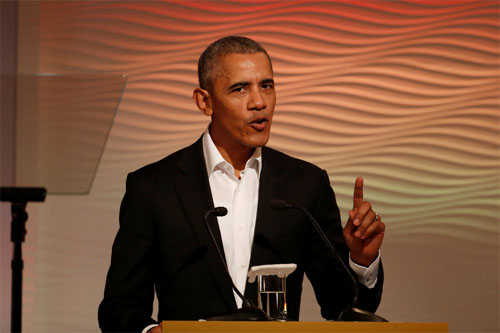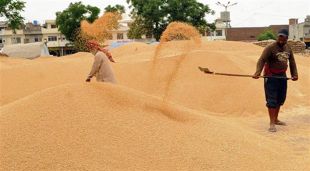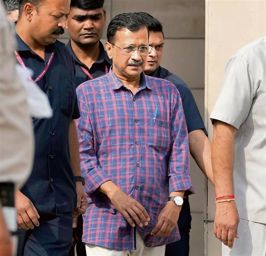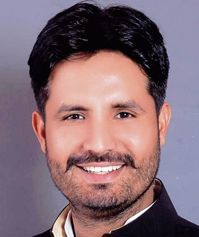
Take note: Former US President Barack Obama has cautioned against intolerance.
KC Singh
RUDYARD KIPLING wrote ‘Oh, East is East and West is West; and never the twain shall meet’. But he was seeing the world through the prism of the 19th century British rule. He could not have foreseen the forces of xenophobia and Islamophobia producing kindred souls amongst leaders of democracies on the opposite sides of the globe i.e., the US and India.
The Economist in its Banyan section says about the Padmavati controversy: ‘A film about heroism brings out the worst in Indian politicians. The poem by the 16th century poet Malik Muhammad Jayasi is a fictional account based on oral traditions and storytelling about the fall of Chittor. The event actually occurred two centuries earlier in 1303. The lore of a princess dying honourably rather than fall in the hands of a Muslim conquerorAlauddinKhilji. The modern day construct of ‘Love Jihad’’, which even the Supreme Court seemed unable to reject outright in the case of an adult woman, Hadiya, is built on the same Jungian fear of a Muslim ravishing a Hindu girl. The BJP’s fringe has been merrily exploiting it as a handy tool for communal polarisation.
The same unwillingness to explore facts and separate them from prejudice-fed make-believe was again on display when PM Narendra Modi likened Rahul Gandhi’s likely elevation as Congress president, albeit by a friendly poll, to Aurangzeb succeeding Shahjahan as the Mughal emperor. The historical allusion could not be more erroneous and betrayed a lack of understanding of the criticality of that accession, done by military force and on battlefield, to the future of the subcontinent. The loser was Prince Dara Shukoh, heir-apparent and elder brother of Aurangzeb, and a believer in a gentler Sufi influenced Islam. In fact, after his arrest he was sentenced to death for apostasy. Aurangzeb’s victory was thus the starting point of the partition of India as he resurrected a conservative and less-tolerant Islam.
It is not a coincidence that former President Barack Obama not only chose to talk of religious tolerance in his 2015 Siri Fort address, being his last public appearance before departure, but recalled now during his post-retirement India visit having then raised it in conversation with PM Modi. During his first state visit to India in 2010, he and Michelle Obama toured Humayun’s tomb. When told the story of Aurangzeb’s accession and the clash between brothers on the interpretation of Islam and that the headless body of Dara Shukoh actually lay in a tomb in the same complex, Obama immediately wished to visit it. The Secret Service disallowed it as it had not been security vetted. Both Obama and his wife stood and bowed their heads in the direction of Dara’s tomb, thus acknowledging that the values Dara stood and died for were the ones US troops are still defending in Afghanistan and the wider Islamic world. It, in fact, is the dilemma the entire Islamic world confronts today.
To thus use Aurangzeb’s accession as a political metaphor for automatic elevation of Rahul Gandhi betrays ignorance of history but still cannot match President Donald Trump causing an international incident by retweeting three tweets, which had fake anti-Islamic videos attached, of an extreme right-wing group called Britain First. Its leader Paul Golding was expelled from the British National Party, itself a marginal force which got just 1 per cent vote in three out of 650 parliamentary seats in the UK. When the British PM’s staff berated Trump for the unthinking peddling of communal trash he responded, ‘Theresa, don’t focus on me, focus on the destructive Radical Islamic Terrorism....’
Meanwhile, Saudi Crown Prince Mohammad bin Salman is trying to de-radicalise his own clerical order, which has exported the most intolerant version of Islam called Wahhabism since 1979 and allowed it to become the dominant force in international Islam. German Chancellor Angela Merkel faces political logjam unable to put together a coalition. Her current dilemma is traceable to her brave step in allowing over a million refugees fleeing the crisis in Syria. Public opinion in the West has turned against asylum for refugees, deserving as they may be, their minds poisoned by bigotry.
President Trump has put his son-in-law Jared Kushner to forge a peace agreement for settling the long-standing dispute between Palestine and Israel. A threat to shift the US Embassy to Jerusalem is being used to bring all factions of the Palestinians to the table and retain the support of Saudi Arabia, Jordan, Egypt, etc. A final proposal is expected around spring 2018. But that is contingent on multiple diplomatic balls now in the air. Trump is simultaneously trying to roll back the influence and presence of Iran in Syria and Yemen. The Qatari imbroglio is still without a solution. In Afghanistan, despite threats to Pakistan, so far there is no evidence of Pakistanis having come on board to push the Taliban towards the negotiating table and defang the Haqqanis. In any case, the Taliban will gravitate towards Iran and Russia, as it already is, if Pakistanis try to arm-twist them.
The path to de-radicalising Wahhabi Islam is a difficult one. Bigotry certainly is unlikely to help despite Saudis turning a new leaf. The BJP must not alternate between bigotry during elections (as The Economist bemoans about India: ‘With another election always around the corner...’) and disruptive economic change and cultural chauvinism at other times. That makes for poor governance and breaches the letter and spirit of our Constitution. Similarly, Trump mindlessly pandering to his base, exploiting their prejudices and taking potshots at world leaders detracts from the prestige of US presidency.
The great American President Theodore Roosevelt said: ‘I do not represent public opinion, I represent the public. There is a wide difference between the two, between the real interest of the public, and the public’s opinion of these interests. I must represent not the excited opinion of the West, but the real interests of the whole people’. There could not be better advice to those leading the oldest and the most powerful democracy i.e., the US and the biggest and the most diverse democracy i.e., India.



























